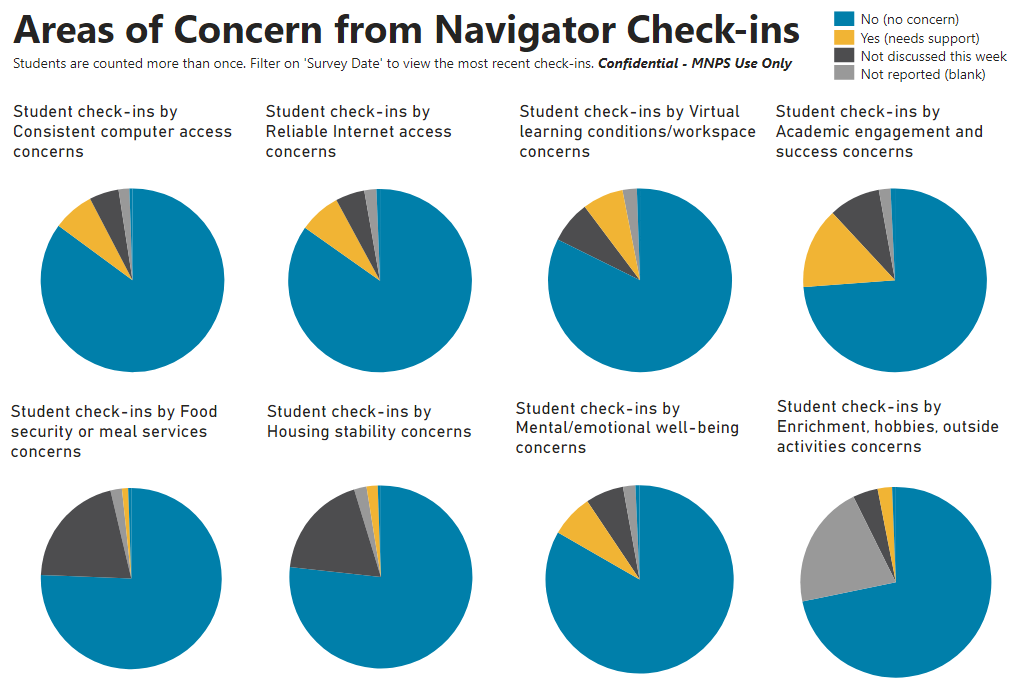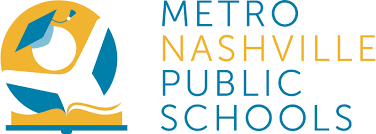Overview
In the summer of 2020, Metro Nashville Public Schools gathered a cross-functional district team to plan for school reopening. Across conversations, it became clear that a key challenge would be rebuilding and maintaining each student’s connection to school. Dr. Keri Randolph, Executive Officer of Strategic State, Federal and Philanthropic Investments at Metro Nashville Public Schools, reflected on the realization that a new program would be necessary to meet this goal:
“We have a real need; we can do this. We're going to open virtually and these [Navigator check-ins] are usually the conversations we have in the hall or in the cafeteria or when we can see a student in person. And just to make that connection, we have to have a system— a really intentional system— around those check ins in this virtual world.” - Dr. Randolph
Approach
The Metro Nashville team oriented around a goal of having “every student known” and launched an ambitious program called Navigator to ensure every student had an ongoing, weekly connection point to a dedicated adult. To do this, the team worked with schools to assemble a corps of over 5,600 adult navigators— ranging from teachers, to support faculty, to central office staff— who were paired with 6 to 12 students.
“We met with all of the principals and all of the executive directors over those schools to talk about the non-negotiables. […] Every student must have a weekly check- in from a navigator at the school level, but we encouraged schools to think beyond teachers. We needed to think holistically about the staff at the school and who can serve in this role. Our goal was to take all the students at the school as our numerator and grow the denominator as big as possible. We have some front office staff and cafeteria workers serving as navigators. The criteria that we encouraged schools to think about was who can form strong relationships with kids.” - Dr. Randolph
The district team provided core training, check-in scripts, and, if needed, translators, for navigators. Navigators focused on building relationships with each student as well as collecting holistic data on students’ needs ranging from food and housing security, to technology, to social, emotional, mental, and academic wellbeing. These data were centrally reviewed and stored in a central dashboard, allowing school and central office teams to push in personalized supports for students based on their needs.
“It's updated in real time so that allows us to push in at the district level to the student level as well. For example, the HERO program which serves our homeless students or those with housing insecurity is an important resource. If a navigator clicks a box that indicates concerns that a family or student might have some housing needs, then that team can push in directly from the district level. That was one of the big value adds for schools. ‘You're not in this alone. We are monitoring this data and pivoting.’ This data is such a rich source of information as we work to support our students.” - Dr. Randolph
When the program launched, nearly 100 schools participated. By the end of the 2020-2021 school year, the Navigator program had expanded district-wide and is “here to stay.” District leaders are now working to streamline the workload processes for staff and build more robust data systems.
“Sometimes that system falls down for a kid. And so we've really done a lot of data tracking there and improved that system in general across the board, which I'm really proud of. What I hope is that that creates a web of support where students aren't falling through those cracks, which is often a worry for all of us all the time, but particularly when we have students who are not with us in person.” - Dr. Randolph
This strategy is a part of TLA's Hop, Skip, Leapfrog release, which explores the concrete ways in which schools and systems pursued student-centered innovation during COVID-19. Explore the full guide to find additional strategies, insights, and resources.
Strategy Resources
Metro Nashville Public Schools Navigator Handbook
This tool outlines key goals, processes, and tools associated with the MNPS Navigator program. It... Learn More
Launching the Navigator Program: "Every Student Known, Cared For, Respected, and Supported"
Dr. Keri Randolph, Executive Officer of Strategic State, Federal and Philanthropic Investments at Metropolitan Nashville... Learn More
Navigator Dashboard & Areas of Concern
Metro Nashville Public Schools created a new district-wide point-person program to ensure every student was... Learn More

